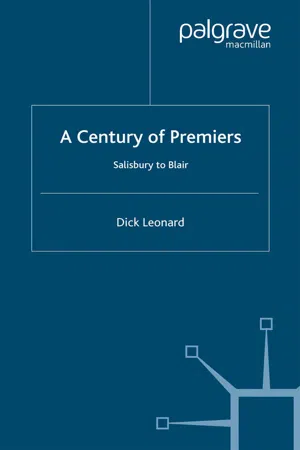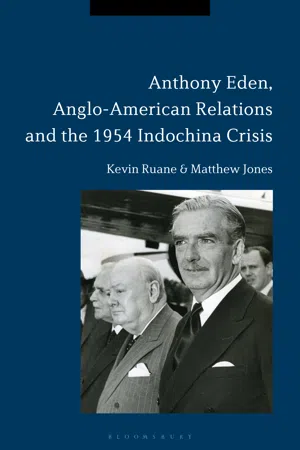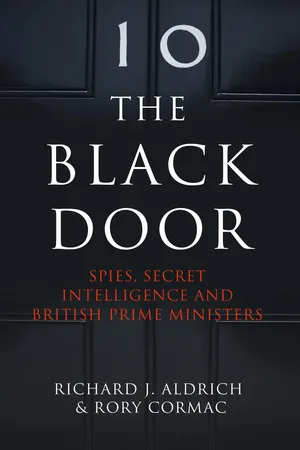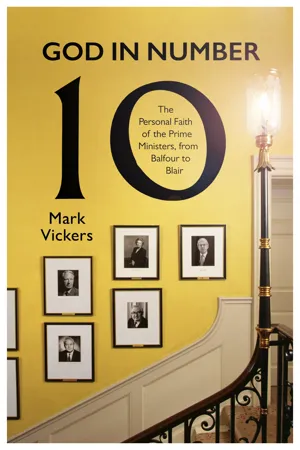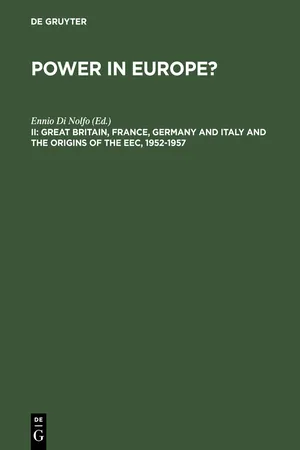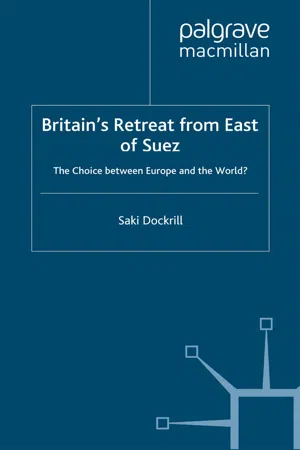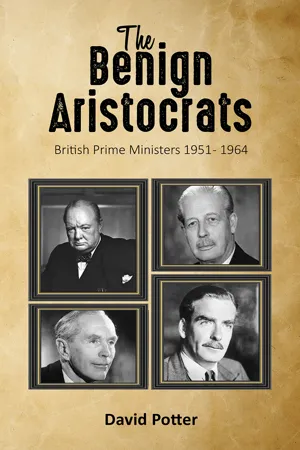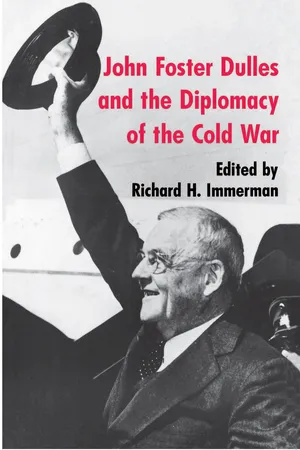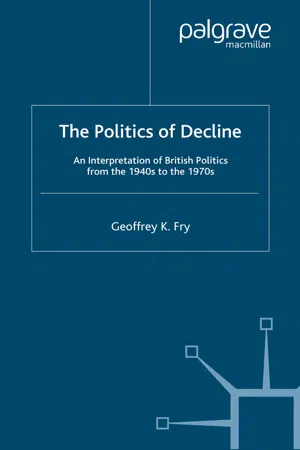History
Anthony Eden
Anthony Eden was a prominent British politician who served as Prime Minister from 1955 to 1957. He is best known for his handling of the Suez Crisis in 1956, during which he sought to regain control of the Suez Canal from Egyptian President Gamal Abdel Nasser. Eden's leadership during this crisis ultimately led to his resignation and tarnished his political legacy.
Written by Perlego with AI-assistance
Related key terms
1 of 5
9 Key excerpts on "Anthony Eden"
- eBook - PDF
A Century of Premiers
Salisbury to Blair
- D. Leonard(Author)
- 2015(Publication Date)
- Palgrave Macmillan(Publisher)
In truth, Eden was a tragic figure, who had too lightly chosen the wrong career path after the First World War. Behind his elegant exterior, he lacked too many of the qualities necessary for effective political leadership at the highest level. He proved himself incapable of taking big decisions on a rational basis, his temperament was too brittle and he was too thin-skinned to cope with criticism, while his character contained more than a dash of naivety. It was a great pity that he did not follow his initial inclination to try for the Diplomatic Service – he would have cut a glittering figure presiding over the embassy in Paris or Washington, faithfully carrying out the policies determined by his political masters, without suffering the agony of having to decide on them himself. Sir Anthony Eden 207 Works consulted Carlton, David, Anthony Eden, London, Allen Lane, 1981. Clark, William, From Three Worlds, London, Sidgwick & Jackson, 1986. Dictionary of National Biography 1971–1980, Supplement, Oxford, Oxford University Press, 1986. Dixon, Piers, Double Dilemma: The Life of Sir Pierson Dixon, Don and Diplomat, London, Hutchinson, 1968. Dutton, David, Anthony Eden: A Life and Reputation, London, Hodder Arnold, 1997. Hennessy, Peter, The Prime Minister: The Office and its Holders since 1945, London, Allen Lane, 2000. Kyle, Keith, Suez, London, 1991. Nutting, Anthony, No End of a Lesson, London, Constable, 1967. Ramsden, John, The Age of Churchill and Eden, 1940–1957, London, Longman, 1996. Rhodes James, Robert, Anthony Eden, London, Weidenfeld & Nicolson, 1986. A Century of Premiers 208 - Kevin Ruane, Matthew Jones(Authors)
- 2019(Publication Date)
- Bloomsbury Academic(Publisher)
16 But it is important to recall another Eden – one of the dominating figures in British foreign policy from the mid-1930s to the mid-1950s, an adroit and oft-times successful Foreign Secretary in the Second World War and the early Cold War, and a statesman of international repute and respect. In terms of his skill in the cut-and-thrust of high-level and high-stakes international negotiations, Eden deserves to stand alongside the finest diplomatists to have represented the UK on the world stage.Other than the Liberal Sir Edward Grey, Eden was the longest-serving Foreign Secretary of the twentieth century.17 Born in June 1897 to landed gentry in County Durham, Eden was educated locally before going to Eton, but what might have been a seamless transition from school to university was interrupted by the Great War. In September 1915, aged eighteen, Eden joined the British Army; serving with the 21st (Yeoman Rifles) Battalion of the King’s Royal Rifle Corps, he saw action on the Western Front, won the Military Cross for bravery and became (in 1918) the youngest Brigade Major in the Army. Eden’s Great War experience was searing for him personally (two brothers were amongst the war-dead) and critical in shaping his later foreign policy outlook, especially his commitment to peace and collective security and his faith in the war-avoiding properties of international diplomacy.18Demobilized in 1919, Eden studied Oriental languages (specializing in Persian and Arabic) at Christ Church, Oxford, and after graduating (with a Double First) in 1922, he toyed with becoming a barrister before deciding on a career in politics. In December 1923, he entered parliament as a Conservative MP. Within three years, he was appointed Parliamentary Private Secretary to the Foreign Secretary, Sir Austen Chamberlain. In 1931, when a National coalition government was formed, he was made Under-Secretary of State at the Foreign Office, and in 1935, he entered the Cabinet for the first time as Minister for League of Nations affairs. Blessed with matinée idol good looks, easy charm, exquisite manners and impeccable dress sense, and now the highly visible embodiment of an organization on which so many people’s hopes for lasting peace rested, Eden was amongst the best known and most popular politicians in the country. However, his decorous public image hid from view some less-attractive character traits; vain, petulant, impatient and quick to anger, he was capable of spectacular histrionics. Although these private eruptions tended to subside as quickly as they arose, some who witnessed them wondered whether so thin-skinned and volatile an individual was cut out for a long-term career in the Westminster-Whitehall pressure cooker.- eBook - ePub
The Black Door
Spies, Secret Intelligence and British Prime Ministers
- Richard Aldrich, Rory Cormac(Authors)
- 2016(Publication Date)
- William Collins(Publisher)
8 Anthony Eden (1955–1957) I have no recollections of any such discussions … I certainly never talked about murdering anyone. Anthony Eden 1 Although his time in office was short, Anthony Eden’s eventual accession to the premiership came as no surprise. He had had plenty of time to prepare for it. In increasingly ill health, Winston Churchill had stubbornly clung to power, vainly hoping for a final peace summit with Moscow, leaving Eden, the crown prince, impatiently pacing the grand corridors of the Foreign Office where he had been almost perpetually since 1935. The two had at least one fiery exchange about the old man reneging on a secret deal to stand down in late 1954. 2 After years of serving ably as a respected foreign secretary and waiting resentfully for Churchill to step aside, Eden finally achieved his apotheosis in April 1955. Churchill may have nurtured a ‘cold hatred’ of Eden for forcing him out, but in reality the whole Conservative Party were convinced they would lose the next election if he remained as leader. 3 Entering Downing Street on 6 April, Eden had endless experience of world affairs in peace and war. He had spent three terms and no less than ten years as foreign secretary. With this came a detailed knowledge of the role and functions of intelligence, special operations and black propaganda overseas. Although lacking the imagination and sense of history possessed by Churchill before him and Macmillan after him, he was clever, meticulous and hard-working. Quick-witted, he was able to disentangle complex problems, and had long mastered the art of delicate personal diplomacy. 4 Having served in Churchill’s wartime cabinet, he enjoyed the same intelligence upbringing as the rest of the early post-war prime ministers, from Attlee to Macmillan. Eden’s premiership should have become the textbook example of how a prime minister uses secret service - eBook - ePub
God In Number 10
The Personal Faith of the Prime Ministers, Balfour to Blair
- Mark Vickers(Author)
- 2022(Publication Date)
- SPCK Publishing(Publisher)
Anthony Eden (1955–1957)
‘A prayer of fear’ Robert Anthony Eden was born on 12 June 1897 at Windlestone Hall, County Durham. He was educated at Eton and Christ Church, Oxford.Having served in France during the First World War and studied Oriental Languages at Oxford, Eden contested the mining constituency of Spennymoor as a Conservative in 1922. Elected for Warwick and Leamington in 1923, he held the seat until his retirement in 1957. Eden was a One Nation Conservative, promoting a property-owning democracy. He was appointed Private Parliamentary Secretary to the Undersecretary at the Home Office in 1925 and to the Foreign Secretary, Austen Chamberlain, in 1926. In the National government of 1931, Eden was Undersecretary for Foreign Affairs, regularly deputizing for the Foreign Secretary. He made his reputation at the Geneva Disarmament Conference, becoming convinced of the need for collective action against aggressors. As Lord Privy Seal from 1934, he was responsible for matters pertaining to the League of Nations.When Samuel Hoare was compelled to resign in 1935 for abandoning Abyssinia to Mussolini, Eden replaced him as Foreign Secretary. Confronted by Hitler’s occupation of the Rhineland, Japanese aggression in the Far East and civil war in Spain, he came to support a policy of rearmament. Neville Chamberlain’s interference in foreign affairs and use of informal channels to conduct diplomacy constituted an increasing source of frustration. Eden dramatically resigned in February 1938, opposing the recognition of the Italian occupation of Abyssinia. Anti-appeasers were disappointed, however, by his failure to provide leadership against Chamberlain.On the outbreak of the Second World War, Eden returned to office as the Dominions Secretary. In May 1940 he was appointed to the War Office in the coalition government. Churchill promoted him to the Foreign Office in December 1940. Although the two did not always agree on foreign-policy issues, Eden provided loyal and efficient support to the Prime Minister throughout the war. Participating in the conferences of the Allied leaders, he contributed to the planning of the post-war world order. After the 1945 general election defeat, Eden spent much of the next six years deputizing as Conservative leader while Churchill travelled and wrote his memoirs. - Ennio Di Nolfo(Author)
- 2012(Publication Date)
- De Gruyter(Publisher)
Overstretched and Overstrung: Eden, the Foreign Office and the Making of Policy * by Anthony Adamthwaite It is generally agreed that the 1945 — 51 Labour governments coped well with the retreat from power — the period was 'among the most successful in the history of British external policy'. 1 By contrast, the 1 9 5 1 -5 5 Churchill gov-ernment has won few accolades. Even discounting the retrospective blight cast by the 1956 Suez crisis, Britain's greatest postwar humiliation, the fact remains that the second Churchill cabinet's lasting achievement was small. The descent from power continued apace. Against foreign secretary Anthony Eden's ne-gotiating triumphs in 1954 must be set the withdrawal from the Suez Canal zone, Britain's Middle East bastion. Within a year foreign secretary Harold Macmillan complained of 'Eden's chickens coming home to roost'. 2 Why, despite sharing the same objectives as Labour governments, did the second Churchill administration accomplish less? The explanation lies largely in the interaction of three elements: Britain's want of power to solve her problems; the uneasy Churchill-Eden partnership; the deficiencies of the government machine. The decline of Britain debate can all too easily distort assessments of the second Churchill government. Blanket assertions that postwar governments put grandeur before growth and encouraged debilitating myths are misleading in the context of the early 1950s. The literature often assumes that abandon-ment of world power claims would have enabled leaders to focus resources * I should like to thank the British Academy for a grant which helped me to carry out the research for this essay. For valuable advice, I am indebted to Dr Roger Bullen.- eBook - PDF
Britain's Retreat from East of Suez
The Choice between Europe and the World?
- Saki Dockrill(Author)
- 2002(Publication Date)
- Palgrave Macmillan(Publisher)
International diplomacy was another area in which Britain excelled and it was skilfully deployed by the new Conservative Foreign Secretary, Anthony Eden. Eden was convinced Britain’s world role was more useful and important than any deep commitment to Europe, such as through the projected European Defence Community (EDC), a device to raise West German military effectives. After all, ‘if you were to open the personal mail arriving from overseas in any post office in England’, Eden once told his private secretary, Evelyn Shuckburgh, ‘you would find that 90 per cent of it came from beyond Europe … where British soldiers and administrators had served or British families settled’. Eden asked: ‘How could we ignore all that?’ During the earlier months of the new government, Eden was pre- occupied with the uneasy situation in Iran and Egypt. 31 In 1941, Britain and the Soviet Union had divided Iran between them, ostensibly to protect its independence from the Axis threat. Britain’s main stake in that country was the Anglo–Iranian Oil Company. In April 1951, when the ultra-nationalist and anti-British Mohammed Mussadeq became Prime Minister, the Majlis approved the nationalisation of the Anglo–Iranian Oil company and took over its installations. In retaliation Britain closed down the refinery in Abadan and, as a result, Iran broke off diplomatic relations with London in October 1952. By this time, Eden was convinced that ‘ the longer Mussadeq stayed in power, the stronger the Communist Party would grow in Iran’, but the United States was more sanguine about the situation. It was not until the arrival of the Eisenhower Administration in 1953 that the United States came to regard Iran as a serious Cold War issue. This resulted in the successful Anglo–American covert operation which ousted Mussadeq in August 1953. - Available until 14 Jan |Learn more
The Benign Aristocrats
British Prime Ministers 1951 - 1964
- David Potter(Author)
- 2022(Publication Date)
- Austin Macauley Publishers(Publisher)
Chapter ThreeAnthony Eden
“Omnium consensu capax imperii…nisi imperasset” – so says the very precise, exact, albeit definitely cynical Roman author Tacitus when he sums up the Roman Emperor Galba. Poor Galba did not have much of a chance. He reigned for a matter of months in the middle of a dreadful civil war in what was known as “the year of the four Emperors” 68 – 69 AD. The above quote, however, is remarkably apposite to a similarly short-lived British Prime Minister, Sir Anthony Eden.The quote is translated as “by everyone’s agreement, he was capable of being Emperor…if he hadn’t become one”. The parallels between Eden and Galba are not exact, of course. Eden was not deposed by violence – except that of his own making on someone else – but the study of his life from his birth on June 12, 1897 until the day that he became Prime Minister on April 6, 1955 showed that he was certainly believed by everyone to be “capax imperii”. Indeed one could say that he was even groomed for the job, so apparently cut out for it was he. Sadly his own folly and obsession were what brought him down. It was like the traditional definition of a Shakespearean tragic hero – happy and secure, but for one fatal weakness that brings him down.Robert Anthony Eden was born just a few days before Queen Victoria’s Diamond Jubilee in 1897. Thus from the very start of his life, he was linked with the Empire. He was the son of William Eden, Baronet and his wife Sybil. He was their fourth child, and rumour had it that he was not really William’s child at all with persistent tales of a friendship of his mother with a man called John Wyndham but, as is often the case, there is not any real evidence to back this up. It was hardly unusual for bored aristocratic women to be freer with their favours than what was good for them, and Sybil was undeniably a lady of some charm and beauty, but William Eden, even though, presumably, not unaware of such stories, never considered Anthony to be anything other than the fruit of his loins. Yet there was never any close relationship between father and son. - Richard H. Immerman(Author)
- 2021(Publication Date)
- Princeton University Press(Publisher)
CHAPTER 5 Dulles, Suez, and the British Wm. Roger Louis WE MUST NEVER FORGET, Anthony Eden, the British prime minister, wrote in October 1956, that [John Foster] Dulles' purpose is differ-ent from ours. 1 To Eden the difference could be summed up in two words: Suez Canal, the artery of the British Empire that was critical to Britain's survival but in no sense vital to the United States. Dulles's game, as it appeared to Eden, was to string us along for reasons of American politics and now allow the Suez crisis to become an issue in the presidential election of 1956. 2 Thus there was a ques-tion of motive as well as perception of national interest. Eden and other prominent British leaders believed that Dulles deliberately mis-led them. The phrases up the garden path, dishonest, and dou-ble cross characterized British thought of the time, and the interpre-tation of Dulles as a devious politician has persisted. Dulles not only managed to poison Anglo-American relations but also, according to the extreme judgment of the time, bears the responsibility for the catastrophe of Suez. 3 Yet there was another British view, less dominant but equally sig-nificant, which held that Dulles was an honorable man who differed from the British only in tactics. Sir Roger Makins, the British ambas-sador in Washington, wrote during the early part of the Suez crisis: We agree about the substance of the policy, but differ on method and timing. 4 This interpretation held that the special relationship between the British and Americans had more than a symbolic mean-ing, and that Anglo-American friendship would ultimately survive the Suez crisis. These two views had one element in common. The issue of anticolonialism exacerbated the situation. I have noticed 1 Eden to Selwyn Lloyd, Top Secret, October 6, 1956, PRO, PREM, 11/1102. 2 Eden to Selwyn Lloyd, Top Secret, October 6, 1956, PRO, PREM, 11/1102.- eBook - PDF
The Politics of Decline
An Interpretation of British Politics from the 1940s to the 1970s
- G. Fry(Author)
- 2004(Publication Date)
- Palgrave Macmillan(Publisher)
All told, Eden’s Prime Ministership could hardly have got off to a better start than it did in its early weeks. Yet, a mere 20 months later, in January 1957, in the wake of the Suez adventure, Eden felt compelled to resign. 136 The decline in the authority of both Eden and the Government he led was swift even before the Suez crisis. Attlee’s explanation was that Eden had an unenviable task in following Churchill as Prime Minister, and that Eden lacked experience of running a team. 6 Further, as Churchill had earlier observed, Eden had ‘no experience at all of home affairs. He has always done the Foreign Office, and done it well. But I don’t know how he will get on with all the home stuff.’ 7 Strictly speak- ing, Eden had Ministerial experience at the Dominions Office and the War Office, but both had been for a matter of months, which meant that Eden’s political career had been overwhelmingly concerned with foreign affairs. Eden continued to intervene, much to the irritation of Macmillan, the actual Foreign Secretary down to December 1955. ‘He kept on sending me little notes, sometimes twenty a day, ringing up all the time’, Macmillan recalled. ‘He really should have been both PM and Foreign Secretary.’ 8 Eden preferred to appoint the compliant Selwyn Lloyd as Macmillan’s successor. Though it was foreign affairs, the area of his expertise that brought Eden down, there was no doubt- ing his unsurenesss of touch outside that sphere, especially when it came to economic policy. ‘Get rid of Butler’, Woolton had advised Eden on the latter’s first day as Prime Minister, 9 and Butler should have gone for his own sake in May 1955 instead of, as it turned out, making way for Macmillan as Chancellor of the Exchequer in December 1955, to become Lord Privy Seal and Leader of the House of Commons.
Index pages curate the most relevant extracts from our library of academic textbooks. They’ve been created using an in-house natural language model (NLM), each adding context and meaning to key research topics.
